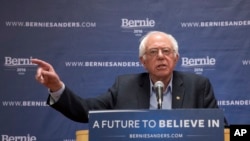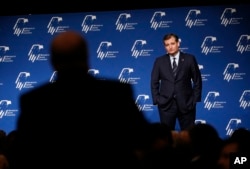U.S. Senator Bernie Sanders won Saturday's Democratic caucus in the Western state of Wyoming, but even in victory he failed to gain ground on his rival, former Secretary of State Hillary Clinton in the race to become U.S. president.
Sanders won 56 percent of the vote. Democratic Party rules left each candidate with seven of Wyoming's 14 delegates.
The win was the eighth in the past nine contests for Sanders, who has pointed to the streak as a sign of momentum for his campaign.
US Presidential Candidate Delegate Count
Delegate Count
Here is an estimated delegate count for each candidate:
Republicans
Donald Trump: 898
Ted Cruz: 560
John Kasich: 153
Democrats
Hillary Clinton: 1,997
Bernie Sanders: 1,238
Total delegates needed for party nomination:
Democrats: 2,383
Republicans: 1,237
* As of April 27, 2016
But he will need to win by much bigger margins under the proportionate delegate system in order to catch Clinton and win the Democratic nomination for president.
Clinton finished Saturday ahead 1,287-1,037 from state voting and has another roughly 500 so-called super delegates pledging to back her.
Sanders will try to continue his streak on April 19 when delegate-rich New York holds its primary.
Clinton holds a double-digit lead in polls there, and will be looking for a win to push her closer to clinching the nomination.
Republicans will also compete in New York, the home state of businessman Donald Trump who leads the race for the party's nomination.
Trump also has a big lead in polls, with some putting him 30 points ahead of Ohio Governor John Kasich and Texas Senator Ted Cruz.
Last week, Cruz scored a big victory in Wisconsin, and on Saturday completed a sweep of delegates in the state of Colorado.
Cruz would have to win more than 90 percent of the remaining delegates in order to earn the majority needed to clinch the Republican nomination before the party's convention in July.
But his recent wins have made it increasingly unlikely that Trump could reach that level either.
Cruz and Kasich are hoping for an open Republican convention where they could try to persuade delegates to select them as a consensus candidate in the fractious contest.






